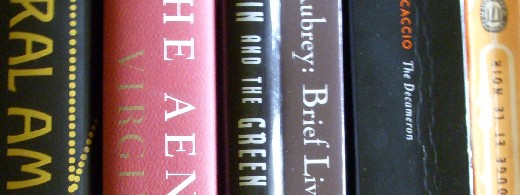Thursday Morning Read
¶ Decameron VII, vi reminds me of a painfully smutty joke that, among numerous others, signaled the end to what Freud called “latency.” The punchline was, “GODDAM IT, DING DONG!!!” But the wife in this story has two men on the side.
In fact, the point of the story is that it’s better to have a couple of lovers on hand. You just get one to chase the other out of the apartment. Then you tell your husband that — Darling! — you have no idea what that was all about. And you’re so glad that he’s home, to protect you from further disturbances.
I know it doesn’t work in The Awful Truth.* But that’s because the fiancé has seen at least one of the interlopers before.
¶ In the Aeneid, Remulus taunts the Trojans, calling them “o vere Phrygiae, neque enim Phryges,” which isn’t very nice and which gets Ascanius good and mad. He shoots an arrow at the Rutulian, and “rends his empty temples with its steel.” Finally, the fun part.Â
¶ Aubrey: Coley, Cooper, Corbet, Cowley, Cromwell (Thomas), Curtin. Many interesting odds and ends, but all I’m going to quote is the Life of Curtin, entire.
Curtin
Madam Curtin, who had a good fortune of £3000, daughter to Sir William Curtin, the great merchant, lately married her footman, who not long after marriage, beats her, gets her money, and ran away.
Interesting mix of tenses, don’t you think? All right, I’m sorry. It sounds funny; but I’m sure that there’s a very sad story here. Possibly even a movie.Â
¶ In Le rouge et le noir, Julien knocks over an ancient Japanese vase. This would impress Mathilde (who thought the vase was hideous) even if Julien didn’t transpose his boo-boo into repartee, by likening the shards to the ruins of his love for her. If only this were true!Â
¶ Clive James on Aleksandr Zinoviev (1922-2006), a writer who was, until today, just a name to me, and a name without a context. (Was he killed in the show trials? Everyone else was.) Because I never engaged with Cold War issues, I have to be patient at times with James, for whom those issues remain the central ones. He’s just that much older than I am, is what it is; and also, I seem to have learned something priceless from all the Dostoevsky that I read in college: namely, that Russia would always be Russia, and that whatever wasn’t Russian about “Communism” would eventually fall away. Vladimir Putin is my poster boy here. An opportunist when it came to party orthodoxy, he is a true Russian at heart — authoritarian, tolerant of thugs if rather fine-featured himself, and impatient with the sloppiness of Western thinking about his country. I don’t admire the man, but he does strike me as right for Russia now. Not desirable, just Russian. No longer saddled with imported ideologies, Russia can begin to get on with it the project of being Russian. Communism was, most of all, a terrible distraction from that.
And it was terrible for everyone, not just the commentariat. Â
Zinoviev’s field was the hellishness of everyday life. He was not an Englishman and had never heard the crack about every Englishman’s dream being to travel alone in a first-class compartment. He was a Russian and had been brought up in conditions of enforced propinquity. His genius was to guess that there was something wrong with it. People were not meant to live on top of each other….
He said that the living conditions could never be allowed to improve beyond a certain point because they were a control mechanism. The system packed everyone together but the resulting irritability had the useful consequence of minimizing human contact. People who spent a large part of the day either standing in long queues or pulling wires to dodge them would not only lack free time to conspire, they would never trust each other.
* The dry martini par excellence of movie comedies.

